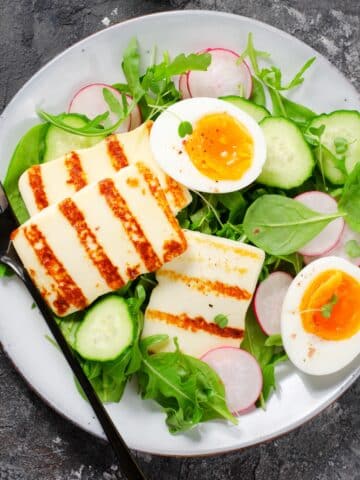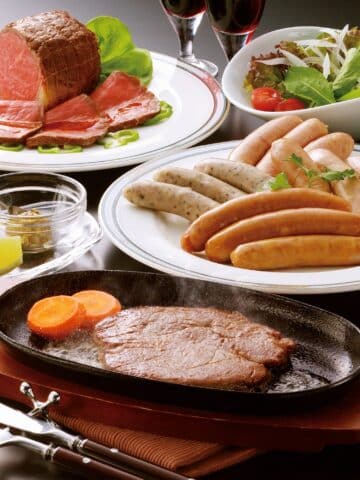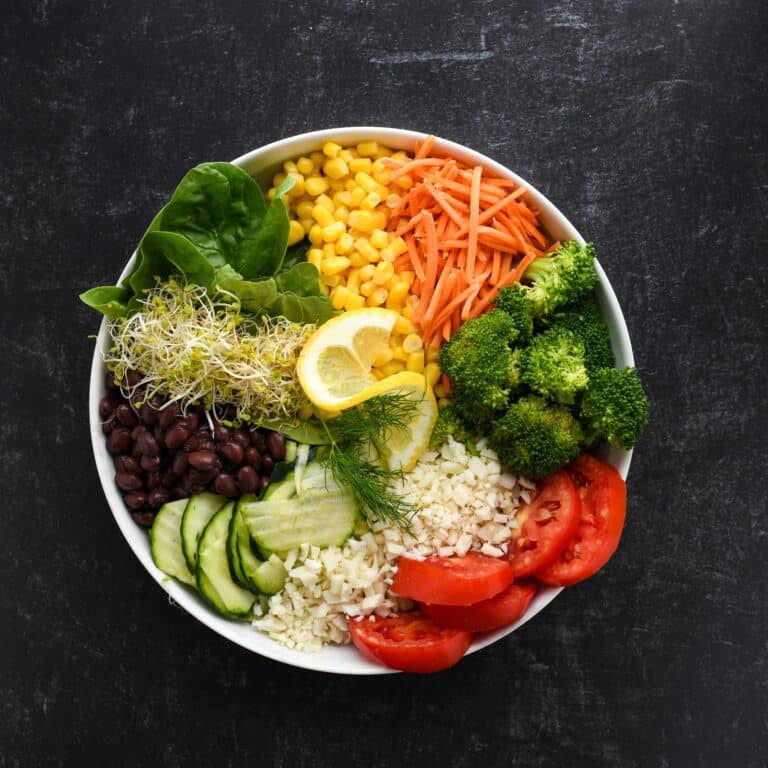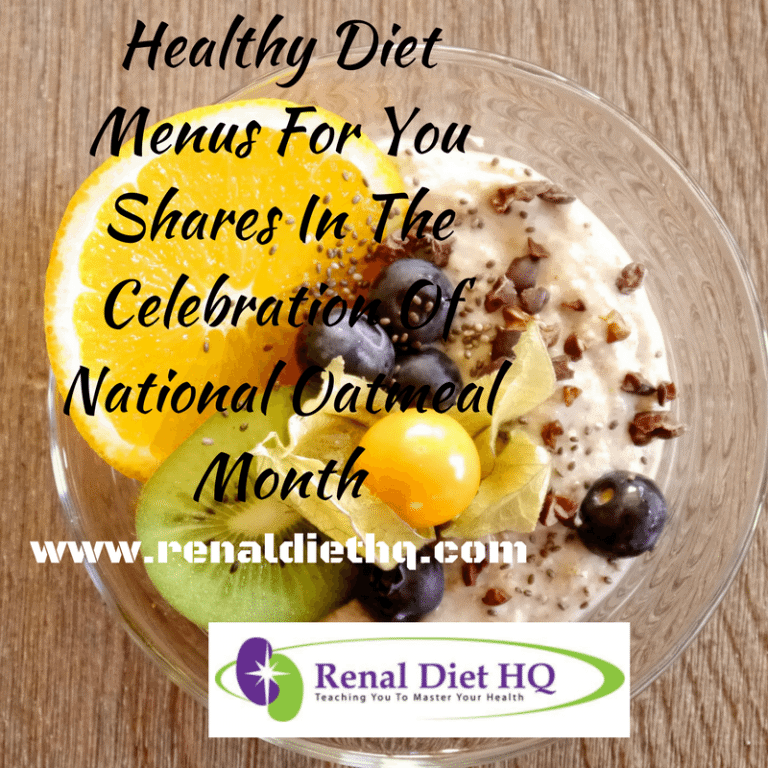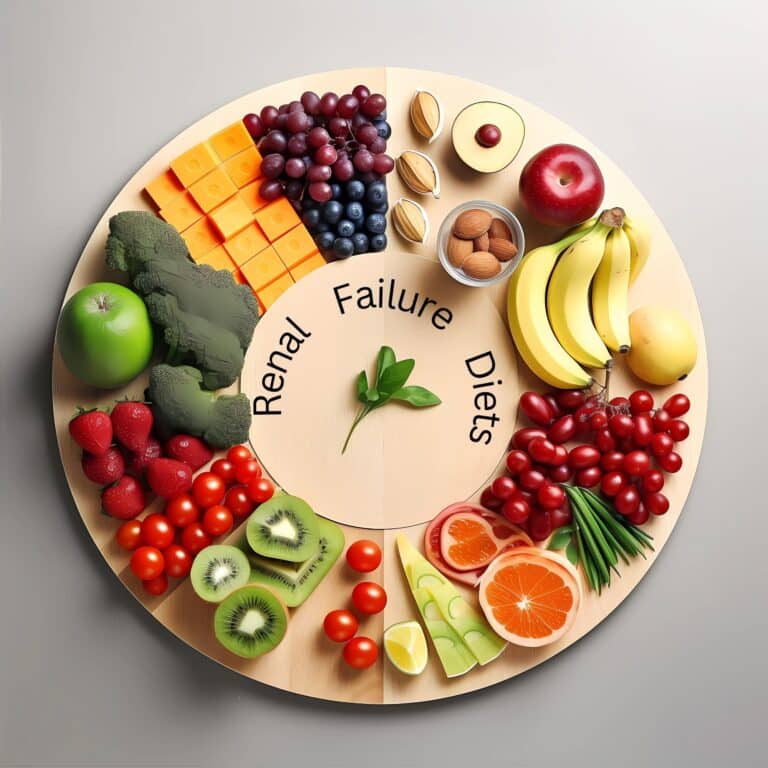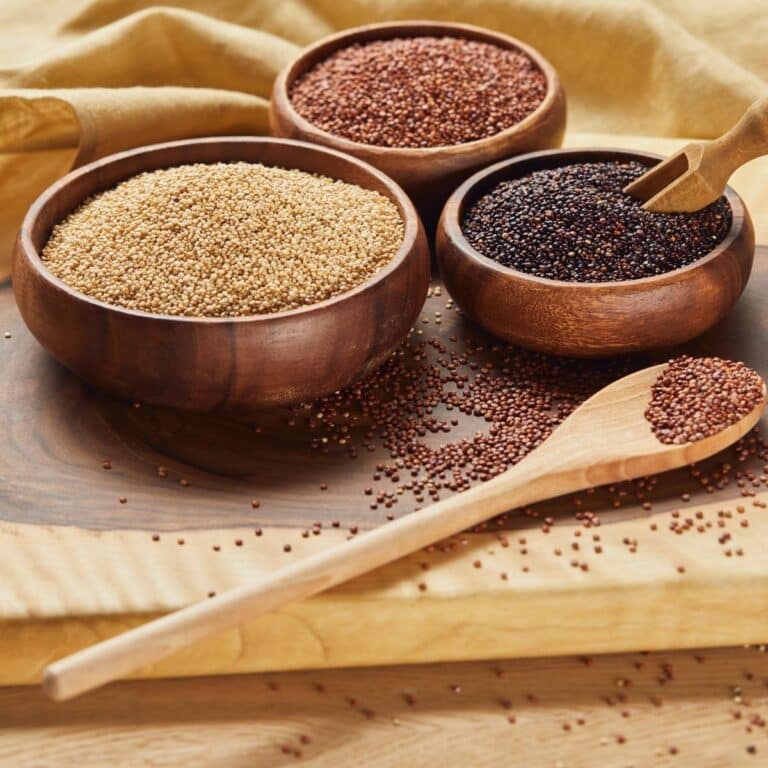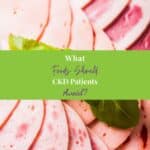CKD Nutrition Coach
Chronic Kidney Disease (CKD) is a debilitating condition that can significantly affect quality of life. People living with CKD have unique dietary needs, and nutrition plays an important role in managing the disease.
A CKD nutrition coach can provide personalized guidance to help people maximize their nutritional intake and promote healthy lifestyle changes. With the right support, it's possible to improve overall health and manage the progression of CKD.

In this article, we'll explore how a CKD nutrition coach can help you better manage your condition so you can lead an active, fulfilling life despite your diagnosis.
Jump to:
- Key Takeaways
- Understanding the Importance of Nutrition in CKD
- Understanding the Nutrients in Food & Your Chronic Kidney Disease
- What is CKD Nutrition Coaching?
- Why it’s important to set goals when you’re battling CKD
- Example Nutritional Goals You May Want to Set
- How to use a Journal or Goal Tracker
- Personalized Nutrition Plans for CKD Patients
- The Impact of Dietary Adjustments on CKD Progression
- Protein Intake and CKD: Guidance from Nutrition Coaches
- Managing Sodium, Potassium, and Phosphorus in a CKD Diet
- Fluid Management in CKD: A Nutrition Coach's Perspective
- Nutrition Coaching for Different Stages of CKD
- Nutrition Coaching for CKD Patients on Dialysis
- Frequently Asked Questions
- A Nutrition Coach Is Essential To Manage Chronic Kidney Disease
Key Takeaways
- A CKD nutrition coach can provide personalized guidance to maximize nutritional intake and promote healthy lifestyle changes for people living with CKD.
- Balancing sodium, potassium, and phosphorus levels is key to maintaining a healthy lifestyle with CKD, and a CKD nutrition coach monitors these three nutrients to help clients maintain control of their diet.
- Proper fluid management is key to managing nutrition in CKD, and a CKD nutrition coach helps clients to be aware of the potential consequences of not staying hydrated and how making wise food choices can help keep the body functioning optimally.
- CKD nutrition coaching provides personalized guidance on low carb diets, weight loss goals, and plant-based meal plans for those living with CKD, and can help individuals with CKD manage their dietary goals and improve their overall quality of life.
Understanding the Importance of Nutrition in CKD
Eating the right foods can be life-saving for those with chronic kidney disease (CKD), so understanding nutrition's importance is critical. Nutrition is of the utmost importance to someone with CKD because it can help to maintain kidney function. Your kidneys work to remove waste from your blood and fluid in your body and for someone with CKD, your kidneys are working harder than others.
So, in order to minimize the strain on the kidneys, improve your health, and help to keep your energy up, nutrition and diet are one of the main priorities to keep in mind with managing your CKD. People living with CKD need to regularly manage fluid balance and make food choices that will support their kidney health.
A CKD nutrition coach should help patients manage their condition through diet by guiding them in making smart food choices based on what best meets their nutritional needs. One of the most important things a CKD nutrition coach can do is create custom meal plans tailored to each patient's specific dietary requirements and lifestyle preferences.
This includes providing advice on how much protein or sodium an individual should be consuming daily, as well as recommendations about portion sizes and frequency of meals throughout the day. In addition, it's beneficial for coaches to offer guidance on how best to navigate grocery stores and supermarkets in order to purchase healthier items for a balanced diet.
For More Recipes and Ideas --->> Get Your Free Meals and Recipes That Are Perfect for Pre-Dialysis Diets, Pre-Dialysis with Diabetes, or Dialysis Diets.

Understanding the Nutrients in Food & Your Chronic Kidney Disease
It is important to understand what is in your food and how it could affect your health. This is a well-known fact for everyone, but as we discussed above, it is imperative for those with CKD to understand why certain foods, fluids, and additives have to be minimized.
Calories
Caloric intake is essential to any healthy diet, and there are healthy limits based on each individual that you should aim to stay between. If you have CKD and want to make sure you are getting an appropriate number of calories you should talk to your physician or dietician to make sure you are on the right track. This is because if you take in an overabundance of calories this could cause you to gain weight and put a strain on your body.
The opposite is also true, not eating enough calories can lead to fatigue, loss of muscle mass, and bone weakness. This is why you should set a goal with your dietician and stick to it!
If you need to cut out calories, then you can cut down portion sizes, eliminate butter and other high-fat dairy products, and cut back on fried foods and sodas. If you want to increase your calories in a healthy way to maintain your weight, then you should find CKD-friendly recipes with appropriate caloric intake. This may include sautéed or gravy-based dishes, honey, and fruit juices.
Protein
If you are in the later stages of CKD, you may be put on a low protein diet by your dietician. This is because excess protein is a big proponent of waste build-up in the bloodstream. While protein is a key part of healing and muscle building you and your dietician should decide what amount of it you may need each day.
Healthy proteins that are popular in CKD diets include turkey, chicken, and fish. However, you can also get protein from dairy products, eggs, and beans. So, depending on the stage of your kidney disease, your body size, and other factors, renal dietitians can plan a protein goal which will work for you.
Sodium
Sodium is a very big deal for those with kidney disease because it can cause your body to retain fluid. Fluid retention can be dangerous to your heart and kidneys and can elevate blood pressure levels. That is why you should try to eliminate as much salt from your diet as possible.
It may be impossible to avoid some salt in your diet, as you need some of it for your body to function properly, but it is definitely an ingredient that you need to look out for and actively avoid excess amounts of it.
You and your dietician can discuss your goals for this often hidden additive and try to plan healthy meals you can enjoy, or discuss areas where you may be having difficulties removing sodium.
Potassium
Balancing potassium levels can be tricky for people with CKD, your diet should be balanced with this mineral and you should not take in too much or too little. If you have kidney disease, your body may have trouble filtering excess potassium out, which makes your watchfulness of foods and snacks that include this mineral even more crucial to your food choices.
Your dietician and physician can assess your current medications, diet, and kidney disease progression to tell you what level you need in your current diet plan. Many foods contain this mineral so it will be very easy to increase and decrease the levels with certain food intake.
Sugars
Sugars can be a big deal in one’s diet especially if you have kidney disease and diabetes, as kidney disease can be negatively affected by too much sugar in the body. Typically sugar intake is not a problem for those without diabetes, but since diabetes inhibits the body’s ability to properly process glucose in the blood, the kidneys can be put at risk.
Carbohydrates
Carbohydrates are good for energy and fiber intake which can help maintain weight, but an over-consumption of high carb unhealthy foods can lead to weight gain which will have ill effects on the kidneys, so be mindful and talk to your doctor about a healthy intake of carbs for your current weight and disease stage.
As carbs are important to maintain adequate energy and your body constantly burns energy, you should be eating a lot of carbohydrates. The key is to eat healthy carbohydrates that contain nutrients and fibers, rather than over processed carbs which will fill up your caloric intake for the day without offering your body any essential nutrients.
Fat
Fats are an essential component of healthy food groups but should be consumed in moderation and in the correct form.
The first thing to know about fats are that there are two types: saturated and unsaturated. Saturated is well-known as the unhealthy fat, which might cause issues with your heart and can also cause an increase in cholesterol levels. Similarly, trans fats can be found in overly processed foods and snacks, and should be avoided for the same health risks.
Unsaturated fats are the healthy fat, composed of things like fish, nuts, and olive oil. These are the best ways to incorporate fat into daily meals. For example, eating fish as your meal’s protein will keep your bad cholesterol lower than things like beef, lamb, and pork.
What is CKD Nutrition Coaching?
You're looking to get your health back on track, so why not explore what specialized guidance can do for you? Nutrition Coaching is a great way to help manage your CKD and make sure that you are eating right.
A nutrition coach can work with you to create individualized meal planning and food choices that meet all of the dietary requirements of someone with kidney disease. They are also knowledgeable about vitamin and mineral supplements, as well as dietary adjustments for those who may have additional medical conditions related to kidney disease. A nutrition coach can also help you establish healthier hydration habits and ensure that your body is getting the necessary nutrients it needs.
| Benefits | How a Nutrition Coach Can Help You |
| Meal Planning | A nutrition coach will help create individualized meal plans based on your specific dietary needs. They will work with you to select healthy foods that fit into your meal plan. |
| Vitamin Supplements | Nutrition coaches have knowledge about vitamin and mineral supplements which may be beneficial for those with kidney disease. |
| Diet Adjustments | Additional special diets or modifications may be recommended depending on any other medical conditions related to CKD. |
| Hydration Habits | They will help establish healthier hydration habits in order to ensure sufficient water intake or fluid restriction throughout the day. |
With an experienced nutrition coach by your side, you'll have better control over managing your diet while living with CKD. You'll learn how to develop long-term strategies that are tailored specifically for dealing with CKD, while still enjoying delicious meals. A coach will work with you to identify triggers for unhealthy eating or behaviors, such as emotional eating or stress management issues.
Eating nutritiously is essential when dealing with a chronic illness like CKD; having a professional's assistance ensures that every aspect of nutrition is taken into account in order to keep you healthy and feeling great!
Why it’s important to set goals when you’re battling CKD
Setting goals when managing kidney disease is crucial to one’s health because it helps them track the amount of nutrients that you are taking in with your food. These goals help someone with CKD to be vigilant of their own health and their diet, and to really understand how what they’re eating may negatively or positively affect their body.
These goals will also help you combat the disease’s progression and make you feel better overall as you meet your lab result goals with your physician. Eating a healthy diet, setting goals, and being watchful of your own health helps to give someone with kidney disease more control over their illness and can improve their attitude and energy levels.
Example Nutritional Goals You May Want to Set
Some examples of nutritional goals you want to set may be putting a limit on the amounts of protein during the day or week. You could also make it a goal to consume as little sodium as possible and track the amounts in the foods you usually eat and find new ways to decrease them.
Another goal that may be important for those with CKD is a limit on fluid intake, which is especially crucial for those on dialysis. If you are on dialysis, you likely have spoken to your dietician and doctor about how much fluid you should be consuming. This goal is central to a patient’s health because fluid retention can cause high blood pressure, swelling, and other complications.
How to use a Journal or Goal Tracker
Using a journal or goal tracker may seem self-explanatory but many people organize differently than others or have trouble starting things like this. So, these are a few helpful apps that can assist you and your family in tracking your food and nutrient intake, and improving your kidney health in the process.
MyNetDiary
This is an app that can be used to track and search for nutrition values specifically related to kidney disease. The base program is free and allows you to log, track, and search for nutrition facts. It also lets you track your fluid intake. The premium option allows you to set targets, import recipes, and track your diabetes.
My Food Coach
This is another phone application that allows you to track and manage your nutrient goals. It offers personalized nutrition information for you and your family to keep track of, and that your physician or dietician can help to change should you need it. This app lets you import, search, and build shopping lists for recipes you find along your diet.
H2Overload
This application is only for fluid intake tracking, blood pressure, and weight management. However, if you are at risk for heart disease or you are currently on dialysis this is a very useful application for fighting against fluid retention and tracking your heart health. It also gives you risk factors and information about when you should call a doctor if your symptoms worsen.
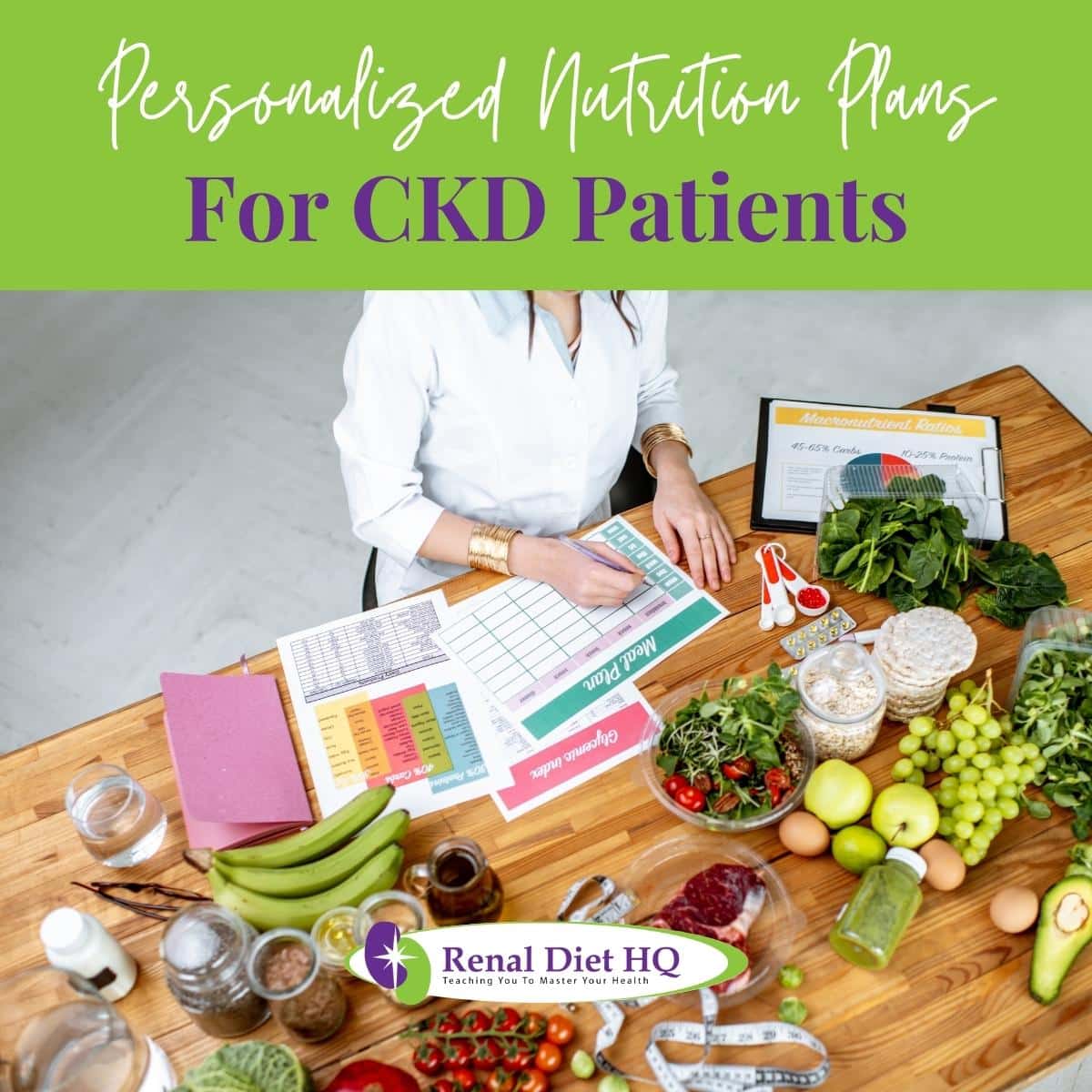
Personalized Nutrition Plans for CKD Patients
Developing a personalized kidney-friendly nutrition plan with the right guidance can help you take charge of your health while living with CKD. A nutrition coach can provide valuable insight into plant-based diets, snacks for CKD patients, food cravings, and vegetarian eating.
Your nutrition coach will guide you through understanding how to read food labels properly so that you can make better-informed decisions about the types of foods that are safe and beneficial to eat in order to maintain optimal health. Many people diagnosed with CKD often experience overwhelming feelings of uncertainty and helplessness due to the dietary restrictions imposed on them.
With the support of a knowledgeable nutrition coach who understands your individual needs, these feelings can be alleviated and replaced by hope as you learn more about developing an evidence-based individualized nutrition plan.
Your nutrition coach will help create an individualized actionable plan which takes into account any medical conditions or nutritional goals that need to be addressed in order to maximize your well-being. This includes discussing portion sizes, meal timing, hydration needs, supplement use if necessary, and most importantly finding out what works best for YOU!
With their expertise and guidance along with proper education on making healthy choices each day, you'll be able to confidently manage your diet while living with CKD and reach all of your personal health objectives.
The Impact of Dietary Adjustments on CKD Progression
Making dietary adjustments can have a significant impact on how your chronic condition progresses. A CKD nutrition coach can help you develop healthy habits that target your individual needs and improve your kidney function. These adjustments include:
- Increasing or restricting fluid intake to regulate your body's fluid balance.
- Reducing daily sodium intake and protein consumption to help prevent CKD symptoms from developing.
- Developing a healthy eating plan tailored to meet specific nutritional requirements for optimal health.
The goal of these lifestyle modifications is to slow down the progression of the disease and allow you to maintain good health longer by providing essential nutrients while limiting foods that are detrimental to kidney function.
Your CKD nutrition coach will provide support, resources, and guidance throughout the process of creating meal plans that fit into your daily life. This will make it easier for you to reach your goals effectively and efficiently without sacrificing delicious meals or feeling deprived!
Through careful monitoring of food choices, portion sizes, nutrient sources, and regular physical activity, you can not only manage but also improve the quality of life with CKD With the help of a CKD nutrition coach, working together towards a healthier future is not only possible but achievable!
Protein Intake and CKD: Guidance from Nutrition Coaches
Managing your protein intake is an important step towards improving your kidney health, and working with a nutrition professional can help you create the best plan for you. A CKD nutrition coach will provide guidance on food choices, portion sizes, and supplements that are tailored to meet your individual protein requirements. They can also assist with carbohydrate counting so that you have the right balance of macronutrients in your diet.
Through regular communication and education from a qualified CKD nutrition coach, you can learn how to make healthier dietary decisions that promote better kidney health. With their support alongside proper medical care from a nephrologist, you'll be able to proactively manage your condition and take steps towards slowing down its progression.
Managing Sodium, Potassium, and Phosphorus in a CKD Diet
Balancing your sodium, potassium, and phosphorus levels is key to maintaining a healthy lifestyle with CKD. A nutrition coach has an important role in helping their clients manage their diet by monitoring these three macronutrients.
| Sodium Balance | Potassium Balance | Phosphorus Balance |
| Limit Salt Intake | Avoid Potassium-Rich Foods | Avoid High-Phosphorus Foods |
| Monitor Sodium Intakes Daily | Be Aware of Supplements & Medications Effects on Potassium Levels | Consider Low-Phosphorus Substitutes for High Phosphorus Foods |
By understanding the importance of micronutrient balance and providing guidance in the form of dietary recommendations, you can take control over your CKD diet.
Your knowledge about nutrient needs combined with effective communication with your nutrition coach can give you the confidence to make healthier choices for yourself and improve your quality of life.
Fluid Management in CKD: A Nutrition Coach's Perspective
When it comes to managing nutrition in CKD, proper fluid management is key. It's important to be aware of the potential consequences of not staying hydrated and how making wise food choices can help keep your body functioning optimally.
You may have heard that renal dieting involves strict fluid restrictions, but there's more to it than that. Let's take a closer look at how you can stay on top of your fluid needs while following a CKD diet.
During the early stages of kidney disease, staying hydrated is essential for preventing dehydration and other serious complications from occurring in people with CKD. It's important to remember that healthy eating isn't just about what foods you should or shouldn't eat — it also involves being mindful of the amount of fluids you're taking in each day as well as when and how often you sip them throughout the day.
However, during the more advanced stages of kidney disease, it may be recommended to limit your intake of fluids, as your kidneys may struggle to get rid of excess fluids.
Depending on the severity of your condition, your doctor may also recommend limiting your intake of certain fluids that might cause electrolyte imbalances, including milk, cream soups, bottled beverages with phosphate additives, and sugary drinks like dark colas and chocolate drinks.
While reducing these items from your diet is helpful for maintaining optimal health levels with CKD, there are still plenty of ways to get adequate hydration while adhering to a kidney diet plan. For starters, water should remain an integral part of any dietary regimen since it helps flush toxins out of the body efficiently and keeps the kidneys functioning properly. Additionally, fruits and vegetables are excellent sources for getting extra fluids into your system.
However, you should make sure to avoid fruits and vegetables with excessive sodium or potassium levels – two minerals which should be monitored closely when living with CKD. By balancing healthy eating with proper fluid intake, you can make sure that any restriction guidelines imposed by doctors are followed correctly while still getting enough liquids into your body every day!
Nutrition Coaching for Different Stages of CKD
As a CKD patient, it is important to consider the changing nutritional needs throughout the different stages of the disease and how a nutrition coach can help you manage them. A nutrition coach can provide guidance on diet modifications that are tailored to your individual needs as your kidney health changes.
They will be able to ensure that you have the correct balance of protein, sodium, and other electrolytes in your diet, as well as make sure you know what foods are safe for consumption when taking certain CKD medications.
| Stage of CKD | Nutritional Needs |
| Early Stages | Reduce your intake of salt & saturated fat, incorporate more fruits & vegetables |
| Middle Stages | In addition to controlling salt and fat, you may have to lower animal protein intake, optimize fluid balance |
| Late Stages | In addition to the above, you may have to consider supplements & phosphate binders and limit your fluid intake. |
A nutrition coach can not only help with dietary recommendations but also provide emotional support during difficult times. They understand the value of positive reinforcement and motivation, which is essential when it comes to making lasting lifestyle changes. Additionally, they can provide helpful information on how to navigate food labels and read ingredients lists so that all dietary restrictions are followed correctly.
By working closely with a nutrition coach throughout each stage of CKD, patients will be better equipped to make informed decisions about their health and wellbeing in order to maximize their quality of life.
Nutrition Coaching for CKD Patients on Dialysis
For CKD patients on dialysis, nutrition coaching can help pave the way for sustainable lifestyle changes, allowing them to better manage their condition and create a healthier future.
The primary goal of nutrition coaching is to increase awareness of CKD diagnosis and diet trends that can improve overall health outcomes. A good nutrition coach will provide personalized support through every stage of the process; from planning meals to setting realistic health goals - they are there every step of the way.
With their expertise in CKD-specific diets, they will be able to provide insights into which foods are best suited for each individual patient's situation. They will also be able to offer practical tips on how to make healthy eating more manageable day-to-day, such as batch cooking or using leftovers from dinner for lunch the next day.
Nutrition coaching is a powerful tool in helping CKD patients on dialysis live a healthier life. By utilizing this service, individuals can gain access to personalized advice that is tailored specifically towards them while being supported by someone who understands their unique dietary needs and preferences. Furthermore, it helps them learn how to make smart food choices that positively impact their health and wellbeing for many years after receiving a CKD diagnosis.
Frequently Asked Questions
It's important for CKD patients to consult with a nutrition coach on a regular basis. A nutrition coach can help with:
. Making informed decisions about what types of foods to eat
. Portion control
. Hydration importance
. Minerals supplementation
. Providing guidance on protein sources
. Tracking nutrition habits over time
With the right support and information from a nutrition coach, CKD patients can better manage their condition and be well-nourished.
When it comes to diet for those with CKD, there are some key elements that should be taken into account. It's important to watch salt intake, as too much can cause fluid retention and lead to further complications.
Protein sources should also be considered; they should come from lean meats and fish, eggs, nuts, and legumes. Hydration levels are also important for CKD patients; during early stages of kidney disease, more water intake may be recommended in order to flush out toxins from the body.
Supplementation of vitamins may also be beneficial, depending on individual needs. Additionally, essential fats such as omega-3 fatty acids may play a role in slowing the decline of kidney function, and can also help protect against heart problems. However, be sure to consult your doctor before deciding to take any supplements.
Overall, careful consideration should be given when deciding on a dietary plan as each person's needs will vary due to their individual health conditions.
When it comes to proper nutrition for kidney health, there are certain foods that should be avoided. It's important to practice portion control, avoid excessive sodium intake, as well as to pay attention to vitamin balance and food variety.
Foods high in saturated fats, phosphorus, potassium, and sodium should be limited or eliminated from your diet. Avoid processed meats, full-fat dairy products like cheese and ice cream, alcohol, sugary drinks like sodas, and high-salt snacks like chips or pretzels. Additionally, limiting red meat is recommended for optimal kidney health.
Working with a nutrition coach can be an affordable way to get guidance on maintaining a healthy diet. Depending on the services you're looking for, costs may vary from as low as $50 USD up to several hundred dollars per month.
A nutrition coach can provide cooking tips, help you learn portion control, go grocery shopping with you, and develop meal plans specific to your needs. They can also advise on vitamin supplements that might benefit your nutritional goals.
Working with a nutrition coach is an investment in yourself that will surely pay off!
Yes, there are many online resources available for CKD patients looking for nutrition guidance. When it comes to diet and nutrition, you'll want to pay close attention to salt intake, hydration levels, grocery shopping, and portion control to ensure that your meals are balanced.
Careful meal planning can also be a useful tool when it comes to staying on track with healthy eating habits. By taking the time to plan out your meals ahead of time, you can ensure that you're getting all the nutrients you need without having to worry about unhealthy snacking or overeating.
A Nutrition Coach Is Essential To Manage Chronic Kidney Disease
You've seen how nutrition coaching can be an important part of CKD management.
With personalized plans, dietary adjustments, and lifestyle changes, a nutrition coach can have a profound effect on your overall health.
It's essential that you find a qualified professional who understands your individual needs and is committed to helping you reach your goals.
With their expertise and support, you'll be able to enjoy a better quality of life for years to come.

